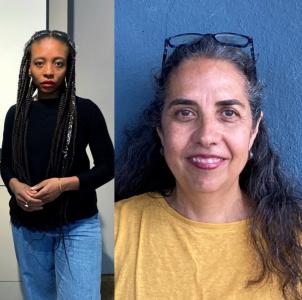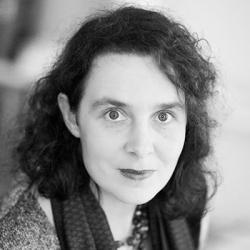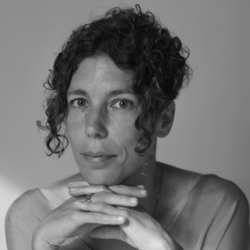REPORTÉ – Euridice Kala & Ana Maria Ochoa Gautier. La voix, matière à tisser des liens renouvelés / Voices to interweave reformed links
Atelier de recherche
REPORTÉ – Euridice Kala & Ana Maria Ochoa Gautier. La voix, matière à tisser des liens renouvelés / Voices to interweave reformed links
The event had to be postponed to an as yet undetermined date. Please excuse the inconvenience.
Neuvième séance du séminaire « Comment exposer la polyphonie ? » avec l’artiste Euridice Kala et l’ethnomusicologue Ana Maria Ochoa Gautier
La rencontre entre l’artiste Euridice Kala et l’ethnomusicologue Ana Maria Ochoa Gautier fait partie du séminaire « Comment exposer la polyphonie ? ». Organisé depuis mars 2021 au DFK Paris par Mathilde Arnoux (directrice de recherche au DFK Paris) et Anne Zeitz (maître de conférences en Arts plastiques à l’Université Rennes 2), ce séminaire accompagne l’élaboration conceptuelle et théorique de l’exposition « Polyphon(e). Polyphonies visuelles et sonores / Mehrstimmigkeit in Bild und Ton ». Quatre premières séances avaient précédé l’inauguration de l’exposition à Gera (Museum für Angewandte Kunst et Kunstsammlung Gera – Orangerie, 2 juillet au 19 septembre 2021). Pour l’ouverture du deuxième volet de l’exposition à Saint-Denis (Musée d’art et d’histoire Paul Éluard, 20 mai au 7 novembre 2022), nous poursuivons la réflexion à travers de nouvelles rencontres avec artistes et théoriciens.
L’artiste Euridice Zaituna Kala s’intéresse aux domaines de l’invisible, de l’inaudible et de l’oubli. Ses recherches portent sur des figures du passé marquées par des expériences de domination, d’exploitation et de ségrégation. Afin de mettre en lumière des événements et des personnes auxquels peu d’attention a été prêtés, qui ont été ignorés, voire dissimulés, elle interroge des archives visuelles et sonores, tout en intégrant le contexte de son propre cheminement à cette enquête. L’artiste incarne des documents d’archives à travers sa voix qu’elle leur prête pour énoncer les liens pluriels qui émergent d’une telle rencontre. Chez Euridice Kala, les documents – en rapport avec ce qu’ils exposent et n’exposent pas – peuvent donner accès à des récits cachés, tout comme l’eau des océans à laquelle l’artiste attribue une fonction d’enregistrement. Par-là, elle nous invite à questionner sans cesse ce qui peut être défini en tant qu’archive ou support de mémoire.
Ce workshop sera l’occasion d’un dialogue de l’artiste avec l’ethnomusicologue Ana Maria Ochoa Gautier qui a mené un travail approfondi sur le rapport entre deux facettes de l’oralité : la première correspond à ce qui est entendu et fait référence à l’oreille (aurality) ; la seconde à ce qui est énoncé de vive voix et fait référence à la bouche (orality). À partir de documents d’archives et de récits, Ochoa Gautier s’intéresse aux modalités de compréhension des traces laissées par les expressions vocales – notamment celles des populations vernaculaires – dans l’écriture de l’histoire de la Colombie au XIXe siècle. Elle étudie la manière dont l’écoute de la voix et son inscription au moyen de la technologie de l’écriture ont contribué historiquement à des processus de subjectivation et ont institué des formes d’appartenance et d’exclusion ; mais aussi, comment les politiques de gouvernance, notamment mises en œuvre à travers la grammaticalisation de ces expressions, ont introduit des pratiques qui masquent ces héritages. Sa méthodologie qui, à travers la lecture, explore la façon dont l’écoute des sons et des voix apparaît dans l’archive, l’a conduite à s’interroger sur la manière dont différents peuples écoutent les types de relations et de distinctions établies entre l’humain et le non-humain. Plus récemment, son travail a exploré les relations entre le changement climatique, le sonique et le décolonial. Dans toutes ces études, les voix sont toujours un matériau permettant de reconfigurer les liens existants.
- Inscription au workshop demandée par mail à marnoux@dfk-paris.org ou anne.zeitz@univ-rennes2.fr.
- Écouter les archives sonores du séminaire sur le site de la radio expérimentale ∏-node : https://p-node.org/broadcasts/polyphon.
English:
Ninth workshop of the seminar “Exhibiting Polyphony” with artist Euridice Kala and ethnomusicologist Ana Maria Ochoa Gautier
The encounter between artist Euridice Kala and ethnomusicologist Ana Maria Ochoa Gautier is part of the seminar “Exhibiting Polyphony”. Organised since March 2021 at the DFK Paris by Mathilde Arnoux (research director at the DFK Paris) and Anne Zeitz (lecturer in Visual Arts at Université Rennes 2), this seminar accompanies the conceptual and theoretical formulation of the exhibition “Polyphon(e). Polyphonies visuelles et sonores / Mehrstimmigkeit in Bild und Ton”. Four workshops preceded the opening in Gera (Museum für Angewandte Kunst and Kunstsammlung Gera – Orangerie, 2 July to 19 September 2021). For the opening of the second part in Saint-Denis (Musée d’art et d’histoire Paul Éluard, 20 May to 7 November 2022), we are continuing the reflection through new encounters with artists and theoreticians.
Euridice Zaituna Kala is interested in the fields of the invisible, the inaudible, and the forgotten. Her research concentrates on figures from the past having experienced domination, exploitation and segregation. In order to shed light on events and people that have gained few attention, that have been largely ignored or even dissimulated, she questions visual and aural archives whilst the context of her own development is part of this inquiry. Euridice Kala incarnates the archives she works with by lending them her voice expressing the plural links that emerge from this kind of encounter. For the artist, documents, by showing and concealing, give access to hidden narratives such as the water of the ocean that can inscribe memory. Through this consideration, Euridice Kala invites us to challenge the definitions of the archive and of other forms of memory.
This workshop will be the occasion for a dialogue between the artist and the ethnomusicologist Ana Maria Ochoa Gautier has carried out detailed work on the relationship between aurality and orality: The first denotes “what is heard or references the ear”; the second to “what is pronounced or references the mouth” (Ochoa Gautier). On the basis of archival documents and narratives, Ochoa Gautier is interested in the ways of understanding the traces left by vocal expressions – particularly those of vernacular populations – in the writing of the history of Colombia in the 19th century. She studies the way in which listening to the voice and inscribing it into the technology of writing contributed historically to processes of subjectivation and instituted forms of belonging and of exclusion; also, how policies of governance, notably implemented through the grammaticalization of these expressions, have introduced practices that mask these heritages. Her methodology, which, through reading, explores how listening to sounds and voices appears in the archive, led her to questions about how different peoples listen to the types of relations and distinctions established between the human and non-human. More recently, her work has explored the relationships between climate change, the sonic, and the decolonial. In all of these studies, voices are always material for reconfiguring existing links.
- Workshop registration requested by mail to marnoux@dfk-paris.org or anne.zeitz@univ-rennes2.fr.
- Listen to the sound archives of the seminar on the website of experimental radio ∏-node: https://p-node.org/broadcasts/polyphon.
Collègue(s) du DFK Paris impliqué·e(s)






